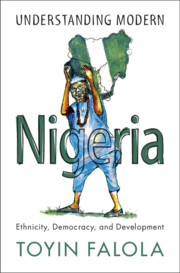Book contents
- Understanding Modern Nigeria
- Understanding Modern Nigeria
- Copyright page
- Dedication
- Contents
- Figures
- Maps
- Preface
- Acknowledgments
- Part I Introduction
- Part II Context and History
- Part III Democracy and Governance
- 7 Ethnicities and Political Identities
- 8 Religion and Geopolitics
- 9 Democracy and Its Limits
- 10 Governance, Citizenship, and the State
- Part IV Development Crises
- Part V Reforms and Revolutions
- Part VI Conclusion
- Bibliography
- Index
9 - Democracy and Its Limits
from Part III - Democracy and Governance
Published online by Cambridge University Press: 09 June 2021
- Understanding Modern Nigeria
- Understanding Modern Nigeria
- Copyright page
- Dedication
- Contents
- Figures
- Maps
- Preface
- Acknowledgments
- Part I Introduction
- Part II Context and History
- Part III Democracy and Governance
- 7 Ethnicities and Political Identities
- 8 Religion and Geopolitics
- 9 Democracy and Its Limits
- 10 Governance, Citizenship, and the State
- Part IV Development Crises
- Part V Reforms and Revolutions
- Part VI Conclusion
- Bibliography
- Index
Summary
“Democracy and its Limits” examines the problems of government and governance in Nigeria, one of the most populous yet least popular conglomerates of democracy (with additional reference to other parts of Africa). Nigeria returned to civilian democracy in 1999, but it was an elite exercise, and the governance has been disappointing. There has been much violence, religious and ethnic conflict, rising poverty, and blatant looting of public funds by the same people entrusted with the funds meant for the development of the nation. This discourse studies how the change in the state has a hidden context, while the critique of governance is regarded as like that of democracy. Despite the propaganda about its advantages and the near-global consensus about its values, democracy is riddled with a lot of contradictions that limit its functional value to a majority of the citizenry. It is expected that political modernity would cause an evolution of political culture and lead to the appearance of viable, resilient institutions that would produce stable politics. However, this study posits that democratic mechanisms can only be effective when the citizenry gives more attention to institutional development and nation building that can endure and function, and not to the politicians, elites, or the military.
- Type
- Chapter
- Information
- Understanding Modern NigeriaEthnicity, Democracy, and Development, pp. 218 - 242Publisher: Cambridge University PressPrint publication year: 2021

